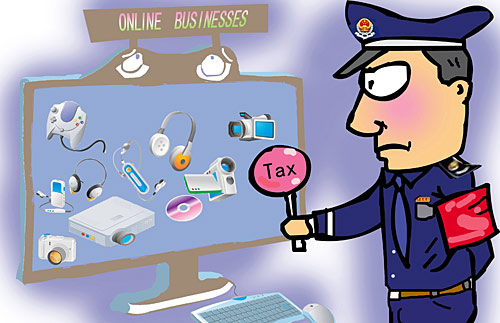|
 |
|
(LI SHIGONG) |
From July 1, people running businesses or offering services online in China are required to register their identities with trading platform operators.
The real-name registration system for online businesses under a new regulation of the State Administration for Industry and Commerce has aroused wide concern. One of the main points of discussion is whether it is a preparatory move to levying tax on online businesses.
There are approximately 404 million netizens in China, 25.5 percent of whom conduct business online. This adds up to more than 100 million people. A report from the China E-Commerce Research Center shows China's online sales reached 260 billion yuan ($38 billion) in 2009. Calculations based on the 3 percent value-added tax rate for small enterprises indicate the annual tax would be 7.8 billion yuan ($1.03 billion).
Since the inception of e-commerce in China, online business operators have taken it for granted that they enjoy tax-free benefits due to the lack of a relevant taxation policy. But, in 2007, an online retailer of baby goods surnamed Zhang was convicted of tax evasion and jailed. It was China's first case of illegal online business operations related to taxation.
The possibility of taxing online businesses has since been hotly debated.
Many online business operators say, despite the high e-commerce transaction volume in China, they do not have a very high profit margin. Although tax exemption for online businesses may cost the government hundreds of millions of yuan in revenue, the development of e-commerce will create jobs for millions of people. With the global financial crisis not yet quite over, China's fledgling online businesses still need government support.
Others say as online trade is a commercial activity, and those operating it should pay taxes. Some online businesses make considerable amounts of money each year, so it's good for reducing the wealth gap to levy individual and income taxes on their operators. Besides, it's unfair to tax physical retail businesses but not their online counterparts.
Right time for tax
Fu Wei (Procuratorial Daily): Online businesses are already economic entities with the purpose of making profits. It will be a huge loss to government revenue not to tax online businesses. Therefore, before specific taxation laws on e-commerce are promulgated, online businesses should pay tax in accordance with current laws.
On the other hand, the government should consider supporting online businesses, including appropriately reducing their taxes, since they are helping to solve the problem of unemployment.
Yang Yang (www.eeo.com.cn): No matter how they are taxed it will be fair for all online businesses. In real life, there are a lot of enterprises evading taxes and the possibility of their being discovered is minimal. But most online businesses will not be able to evade taxes as long as online trading platform operators cooperate with taxation authorities.
Operators bluff about closing their online businesses, saying price rises will scare buyers away. But the reason for online businesses' lower operational costs is not only the zero tax burden but also the fact that there is no need to pay rent and warehousing costs. Even if they are taxed, their overall costs are still lower than ordinary retailers and so are the prices for the commodities they sell. That is why consumers do business online.
If consumers continue doing business online, operators surely will not close their outlets, unless the businesses fail because of poor performance.
There is certainly another possibility. Some businesses cover cost rises themselves, sell their commodities at original prices and then maintain a competitive advantage. Isn't that good?
Many people suggest the government temporarily exempt taxes on online businesses to support their development. What good will postponing tax bring?
The Internet industry in China is not as healthy as in the United States. Now the U.S. online market is more than 10 times that of China. Why is China's e-commerce developing slowly? It should be mainly blamed on the "free service" model preventing service providers from receiving due payment.
Why should we justify this kind of unhealthy development model?
If China's online businesses are able to develop only with tax-free benefits, they will never be strong even if they become big in the short term. They also won't be able to win in overseas markets because rules are different there.
Shu Shengxiang (China Youth Daily): Regulations on value-added tax say, in China, any company or individual selling products or offering processing and/or maintenance services is subject to value-added tax. Based on this, online sales are not excluded from paying value-added tax.
But, due to a lack of definite taxation policies for online businesses, authorities have never taxed online businesses for long. This is unfair to taxpayers who conduct trade offline. Along with the expansion of e-commerce, it's just a matter of time before online businesses are taxed. Taxation authorities must issue definite regulations on the taxing of online businesses as soon as possible.
| 